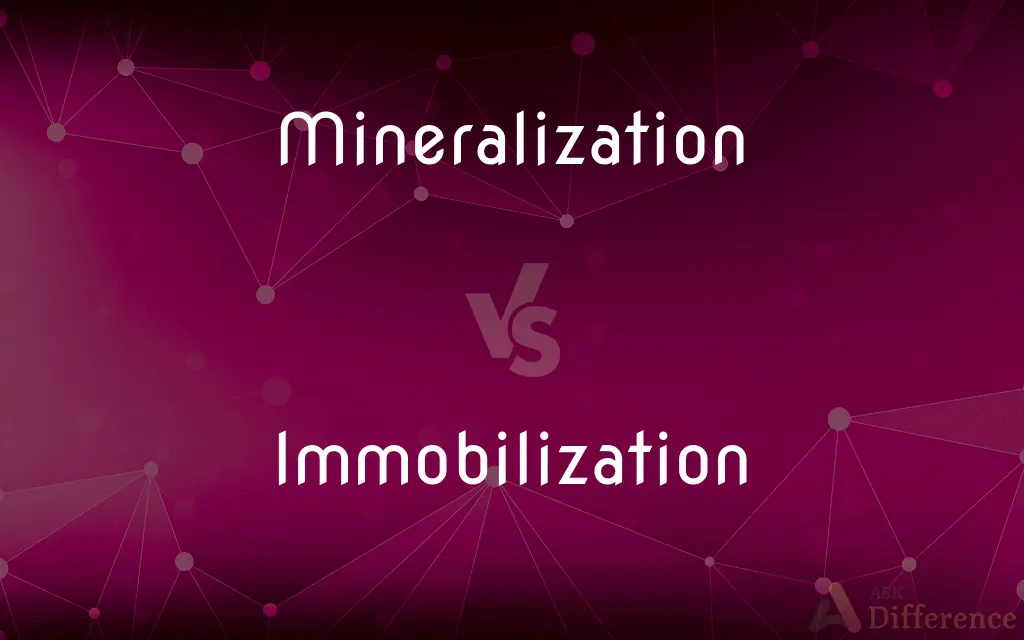Mineralization vs. Immobilization — What's the Difference?
Edited by Tayyaba Rehman — By Fiza Rafique — Published on October 27, 2023
Mineralization: Process of converting organic matter into inorganic minerals. Immobilization: Restriction of movement or the conversion of nutrients into unavailable forms.

Difference Between Mineralization and Immobilization
Table of Contents
ADVERTISEMENT
Key Differences
Mineralization and Immobilization are biological and geochemical processes often discussed in the context of soil science. While Mineralization involves the conversion of organic substances into inorganic form or minerals, Immobilization pertains to the capture and holding of substances, often making them unavailable for uptake.
In ecosystems, Mineralization plays a crucial role in nutrient cycling. It's the process by which decomposer organisms break down organic matter, releasing inorganic nutrients into the soil. In contrast, Immobilization is when certain soil microbes take up these nutrients, effectively making them unavailable to plants.
It's essential to realize that both Mineralization and Immobilization are interconnected and vital for soil health. For instance, through Mineralization, nitrogen in organic form is converted to ammonium. However, through Immobilization, this ammonium can be taken up by microbes and temporarily withheld from plant use.
In broader contexts, Mineralization might refer to the deposition of minerals within organic tissues, as in the formation of bones or teeth. On the other hand, Immobilization can mean the restriction of movement, such as in medical contexts where a bone fracture might require immobilization.
It's the balance between Mineralization and Immobilization in ecosystems that ensures nutrient availability and maintains soil fertility. Disruptions in these processes can impact plant growth and overall ecosystem functioning.
ADVERTISEMENT
Comparison Chart
Definition
Conversion of organic matter into minerals.
Restriction of movement or making nutrients unavailable.
Role in Soil
Releases inorganic nutrients into soil.
Captures and holds nutrients, making them unavailable.
Biological Process
Breakdown of organic matter by decomposers.
Uptake of nutrients by microbes.
Contexts
Often in relation to nutrient cycling in ecosystems.
Can refer to both nutrient availability and medical contexts.
Impact on Nutrient Availability
Increases nutrient availability for plants.
Decreases immediate nutrient availability for plants.
Compare with Definitions
Mineralization
Process of depositing minerals in organic tissues.
Bone Mineralization is essential for skeletal strength.
Immobilization
Making nutrients unavailable in ecosystems.
High microbial activity can lead to nutrient Immobilization in soils.
Mineralization
Release of elements from organic sources.
The Mineralization of nitrogen is vital for plant growth.
Immobilization
Conversion of available elements to unavailable forms.
Excessive straw addition can lead to nitrogen Immobilization in soil.
Mineralization
Conversion of organic substances to inorganic form.
Soil Mineralization helps in nutrient release for plants.
Immobilization
Capture and containment of substances.
Certain resins are used for the Immobilization of heavy metals in water treatment.
Mineralization
Decomposition process yielding minerals.
Decomposition of dead plants leads to Mineralization of nutrients.
Immobilization
Process of holding or fixing in place.
The fracture required Immobilization with a cast.
Mineralization
Transformation of elements into mineral constituents.
Through Mineralization, organic carbon becomes carbon dioxide.
Immobilization
Restriction of movement or activity.
Immobilization of the wrist helps in faster healing.
Mineralization
To convert to a mineral substance; petrify.
Immobilization
To render immobile.
Mineralization
To transform a metal into a mineral by oxidation.
Immobilization
To fix the position of (a joint or fractured limb), as with a splint or cast.
Mineralization
To impregnate with minerals.
Immobilization
To impede movement or use of
Severe weather immobilized the rescue team.
Mineralization
To develop or hasten mineral formation.
Immobilization
To withdraw (specie) from circulation and reserve as security for other money.
Mineralization
To collect or study minerals.
Immobilization
To convert (floating capital) into fixed capital.
Mineralization
A form of fossilization in which the organic parts of an organism are replaced by minerals.
Immobilization
The act or process of preventing a thing from moving.
The broken bones were able to heal, thanks to the immobilization of her leg in a cast.
Mineralization
The breakdown of organic matter in the soil to form soluble inorganic compounds.
Immobilization
(soil science) The process in which organic soil matter is decomposed and absorbed by microorganisms, and thus not available to plants.
Mineralization
(medicine) The deposition of calcium salts in abnormal parts of the skeleton.
Immobilization
Fixation (as by a plaster cast) of a body part in order to promote proper healing;
Immobilization of the injured knee was necessary
Mineralization
The addition of minerals to water to make a mineral water.
Immobilization
The act of limiting movement or making incapable of movement;
The storm caused complete immobilization of the rescue team
Mineralization
The process of mineralizing, or forming a mineral by combination of a metal with another element; also, the process of converting into a mineral, as a bone or a plant.
Mineralization
The act of impregnating with a mineral, as water.
Mineralization
The conversion of a cell wall into a material of a stony nature.
Common Curiosities
Is Mineralization only relevant to soils?
While commonly discussed in soil contexts, Mineralization can also refer to mineral deposition in tissues, like bone formation.
Does Immobilization always refer to nutrients?
No, Immobilization can also refer to restricting movement, especially in medical contexts.
What is the main process involved in Mineralization?
Mineralization involves converting organic matter into inorganic minerals or forms.
How do decomposers relate to Mineralization?
Decomposers break down organic matter, a process leading to Mineralization, which releases inorganic nutrients.
How does Immobilization affect plants?
Immobilization can make certain nutrients temporarily unavailable to plants by holding them in microbial biomass.
Is Immobilization a permanent state in soils?
Not necessarily. Immobilized nutrients can become available later, especially as microbes die and release their content.
Are Mineralization and Immobilization opposite processes?
They're interconnected but not strictly opposite. Mineralization releases nutrients, while Immobilization captures them.
Which process, Mineralization or Immobilization, is more beneficial for plants?
Both are essential for ecosystem balance. While Mineralization provides nutrients, Immobilization ensures nutrient retention.
Can Mineralization affect water quality?
Yes, excessive Mineralization can lead to the release of elements like nitrogen, affecting water ecosystems.
Why might a broken bone need Immobilization?
Immobilization prevents movement, allowing the bone to heal correctly without further damage.
How does Mineralization relate to carbon cycling?
Mineralization of organic carbon leads to the release of carbon dioxide into the atmosphere.
How does Immobilization affect microbial communities?
Immobilization reflects microbial uptake of nutrients, indicating active microbial communities.
Can human activities influence Mineralization rates?
Yes, activities like farming, waste disposal, or land-use changes can impact Mineralization in soils.
Can bone Mineralization be affected by diet?
Yes, diet plays a role, with nutrients like calcium and phosphorus being crucial for bone Mineralization.
Why might Immobilization be used in water treatment?
Immobilization techniques can capture and contain contaminants, making water safer for consumption.
Share Your Discovery

Previous Comparison
Opulence vs. Wealth
Next Comparison
Population vs. DemographyAuthor Spotlight
Written by
Fiza RafiqueFiza Rafique is a skilled content writer at AskDifference.com, where she meticulously refines and enhances written pieces. Drawing from her vast editorial expertise, Fiza ensures clarity, accuracy, and precision in every article. Passionate about language, she continually seeks to elevate the quality of content for readers worldwide.
Edited by
Tayyaba RehmanTayyaba Rehman is a distinguished writer, currently serving as a primary contributor to askdifference.com. As a researcher in semantics and etymology, Tayyaba's passion for the complexity of languages and their distinctions has found a perfect home on the platform. Tayyaba delves into the intricacies of language, distinguishing between commonly confused words and phrases, thereby providing clarity for readers worldwide.
















































